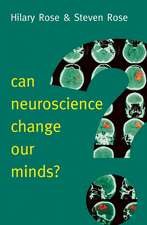The Physiological Mechanisms of Motivation
Editat de D. W. Pfaffen Limba Engleză Paperback – 24 ian 2012
Preț: 399.88 lei
Nou
Puncte Express: 600
Preț estimativ în valută:
76.53€ • 79.60$ • 63.18£
76.53€ • 79.60$ • 63.18£
Carte tipărită la comandă
Livrare economică 12-26 aprilie
Preluare comenzi: 021 569.72.76
Specificații
ISBN-13: 9781461256946
ISBN-10: 1461256941
Pagini: 500
Ilustrații: XIV, 482 p. 30 illus.
Dimensiuni: 155 x 235 x 26 mm
Greutate: 0.69 kg
Ediția:Softcover reprint of the original 1st ed. 1982
Editura: Springer
Colecția Springer
Locul publicării:New York, NY, United States
ISBN-10: 1461256941
Pagini: 500
Ilustrații: XIV, 482 p. 30 illus.
Dimensiuni: 155 x 235 x 26 mm
Greutate: 0.69 kg
Ediția:Softcover reprint of the original 1st ed. 1982
Editura: Springer
Colecția Springer
Locul publicării:New York, NY, United States
Public țintă
ResearchCuprins
One: Concepts.- 1 Motivational Concepts: Definitions and Distinctions.- 2 Instinct and Motivation as Explanations for Complex Behavior.- Two: Hunger and Thirst.- 3 Taste: A Model of Incentive Motivation.- 4 Brain-Stem Control of Ingestive Behavior.- 5 Satiety and the Problem of Motivation.- 6 Physiological and Behavioral Basis of Human Obesity.- 7 The Physiology of Thirst.- Three: Thermal, Maternal, and Sexual Motivation.- 8 Are There Similarities Between Thermoregulation and Sexual Behavior?.- 9 Hormonal and Neural Mechanisms Underlying Maternal Behavior in the Rat.- 10 Neurobiological Mechanisms of Sexual Motivation.- Four: Approach vs. Avoidance in Motivation and Emotion.- 11 The Opponent Processes in Acquired Motivation.- 12 Brain-Stimulated Reward and Control of Autonomic Function: Are They Related?.- 13 Brain Mechanisms in Hedonic Processes.- 14 Motivation and Psychological Stress.- 15 A Physiological and Psychological Analysis of Pain: A Potential Model of Motivation.












